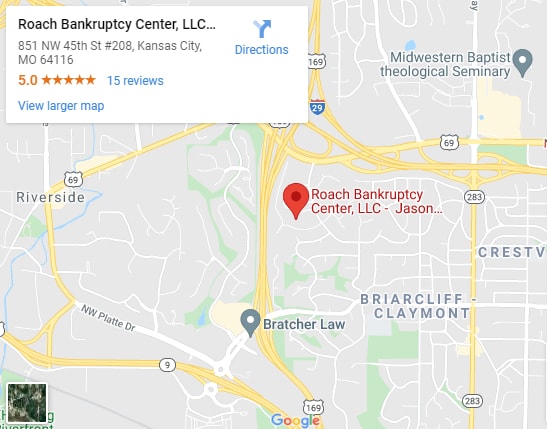Discover How Bankruptcy Can Help You Discharge Tax Debts and Achieve Financial Freedom
If you’re facing challenges with increasing tax debts, you might be wondering if there are ways to discharge tax debts in bankruptcy. Fortunately, bankruptcy can potentially provide a solution and offer a fresh start for those burdened by significant financial obligations.
In this article, we will explore the various methods to discharge tax debts through Chapter 7 and Chapter 13 bankruptcy. Given the complexity of this process, it is essential to seek guidance from our experienced attorneys at Roach Bankruptcy Center, LLC, a reputable bankruptcy law firm in Kansas City, MO. Contact us today to ensure the best outcome for your financial situation.
Will a Chapter 7 Bankruptcy Help Me Wipe Out Eligible Tax Debts?
Chapter 7 bankruptcy, also referred to as “liquidation bankruptcy,” is a popular option for people dealing with significant financial difficulties. It requires selling assets not protected by exemptions to repay creditors, which may include tax debts. Yet, not all tax debts are eligible for discharge in Chapter 7. To qualify, specific conditions must be met:
- Income Tax Debts: Chapter 7 bankruptcy allows for the discharge of income tax debts, but it doesn’t apply to certain types of tax debts, like payroll taxes or fraudulent tax filings.
- Three-Year Rule: To qualify for discharge, the tax debt must be associated with a tax return due at least three years before filing for bankruptcy.
- 240-Day Rule: The IRS must assess the tax debt at least 240 days before filing for bankruptcy, as any extensions or offers in compromise can affect this timeline.
- Non-Fraudulent Tax Return: It’s essential that the taxpayer file a genuine and non-fraudulent tax return. Otherwise, fraudulent activities could lead to non-dischargeable tax debts.
Can Chapter 13 Bankruptcy be a Repayment Plan for Tax Debts?
Chapter 13 bankruptcy, also known as “reorganization bankruptcy,” takes a different approach to handling tax debts. Instead of selling assets, Chapter 13 sets up a 3 to 5-year repayment plan, allowing gradual debt repayment. This option is beneficial for those ineligible for Chapter 7 or wanting to safeguard non-exempt assets.
In Chapter 13 bankruptcy, tax debts are combined with other unsecured debts such as credit card bills and medical expenses, into a single manageable payment plan. While not all tax debts are completely discharged, the repayment plan typically offers relief and a clear path toward achieving financial stability.
What if Discharging My Tax Debts is Impossible With Bankruptcy?
Certain tax debts are usually not dischargeable in bankruptcy. These include recent income tax debts related to tax returns due within the last three years before the bankruptcy filing. Payroll taxes are also non-dischargeable as they are considered trust fund taxes. Furthermore, debts arising from tax fraud or willful tax evasion are also non-dischargeable.
Strategies to Address Non-Dischargeable Tax Debts
Even if your tax debts are not dischargeable through bankruptcy, several options may still be available to manage and resolve your tax obligations:
- Negotiate with the IRS: The IRS might agree to negotiate a payment plan, offer in compromise, or an installment agreement to assist in settling your tax debt. Maintaining open communication with the IRS and showing your dedication to resolving the debt can prove advantageous.
- Seek Professional Tax Assistance: Seek advice from a tax professional or tax attorney to explore tax relief options. They’ll review your finances, negotiate with the IRS on your behalf, and guide you toward the best course of action.
- Consider an Offer in Compromise (OIC): An OIC is a pact with the IRS to settle your tax debt for less than the total amount owed. To qualify, you must show that paying the full tax liability would create undue financial hardship.
- Establish an Installment Agreement: If you’re unable to pay the entire tax debt all at once, the IRS may permit you to establish an installment agreement to pay off the debt gradually over time.
- Explore Bankruptcy Alternatives: If bankruptcy isn’t suitable for your tax debts, you might want to think about alternative debt relief options, like debt consolidation or debt settlement.
- Prioritize Tax Payments: If you owe multiple debts, it’s important to prioritize tax payments to avoid possible penalties, liens, or legal issues. This way, you can manage your financial burdens while fulfilling your tax obligations.
Do I Need an Attorney to Discharge Tax Debts in Missouri?
Navigating the bankruptcy process, especially when it comes to discharging tax debts, is not a straightforward task. Choosing the wrong ways to discharge tax debts in bankruptcy can also hinder your own financial options. Hiring our experienced attorneys from Roach Bankruptcy Center, LLC is essential for several reasons:
- Eligibility Assessment: A careful evaluation of your financial situation is needed to determine eligibility for Chapter 7 or Chapter 13 bankruptcy. With our attorney’s assistance, we can analyze your circumstances and recommend the most suitable approach.
- Legal Experience: The bankruptcy code is complex and subject to frequent changes. Our legal team stays up-to-date with the latest regulations and knows how to apply them to your benefit.
- Proper Documentation: Bankruptcy filing requires extensive paperwork. Our Missouri bankruptcy attorney ensures the correct completion and submission of all required documents, minimizing the risk of delays or denials.
- Protection from Creditors: Upon hiring a bankruptcy attorney, creditors are required to communicate directly with them. This grants relief from constant creditor calls, allowing you the necessary space to concentrate on your financial recovery.
Get the Perfect Option to Discharge Tax Debts With Our Assistance
Discharging tax debts in bankruptcy through Chapter 7 or Chapter 13 can offer a much-needed lifeline for individuals facing overwhelming financial struggles. To maximize the chances of success and to navigate the intricacies of the bankruptcy process effectively, getting the service of our experienced attorneys from Roach Bankruptcy Center, LLC, in Kansas City, MO, is crucial.
There may be many ways to discharge tax debts in bankruptcy, but the best option will always be with assistance from legal professionals. With our guidance, you can work towards a brighter financial future and achieve the fresh start you deserve. Give our attorneys a call today to file a Chapter 7 or Chapter 13 bankruptcy, and get a free initial consultation!



